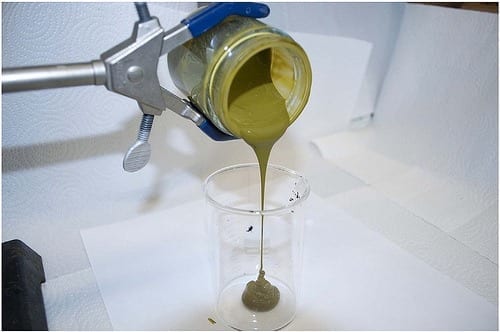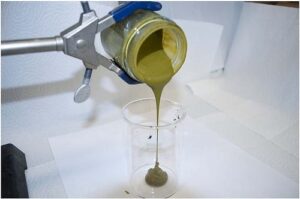Process simplifies transformation of algae to oil, water and usable byproducts
Engineers have created a continuous chemical process that produces useful crude oil minutes after they pour in harvested algae — a verdant green paste with the consistency of pea soup.
The research by engineers at the Department of Energy’s Pacific Northwest National Laboratory was reported recently in the journal Algal Research. A biofuels company, Utah-based Genifuel Corp., has licensed the technology and is working with an industrial partner to build a pilot plant using the technology.
In the PNNL process, a slurry of wet algae is pumped into the front end of a chemical reactor. Once the system is up and running, out comes crude oil in less than an hour, along with water and a byproduct stream of material containing phosphorus that can be recycled to grow more algae.
With additional conventional refining, the crude algae oil is converted into aviation fuel, gasoline or diesel fuel. And the waste water is processed further, yielding burnable gas and substances like potassium and nitrogen, which, along with the cleansed water, can also be recycled to grow more algae.
While algae has long been considered a potential source of biofuel, and several companies have produced algae-based fuels on a research scale, the fuel is projected to be expensive. The PNNL technology harnesses algae’s energy potential efficiently and incorporates a number of methods to reduce the cost of producing algae fuel.
“Cost is the big roadblock for algae-based fuel,” said Douglas Elliott, the laboratory fellow who led the PNNL team’s research. “We believe that the process we’ve created will help make algae biofuels much more economical.”
PNNL scientists and engineers simplified the production of crude oil from algae by combining several chemical steps into one continuous process. The most important cost-saving step is that the process works with wet algae. Most current processes require the algae to be dried — a process that takes a lot of energy and is expensive. The new process works with an algae slurry that contains as much as 80 to 90 percent water.
“Not having to dry the algae is a big win in this process; that cuts the cost a great deal,” said Elliott. “Then there are bonuses, like being able to extract usable gas from the water and then recycle the remaining water and nutrients to help grow more algae, which further reduces costs.”
While a few other groups have tested similar processes to create biofuel from wet algae, most of that work is done one batch at a time. The PNNL system runs continuously, processing about 1.5 liters of algae slurry in the research reactor per hour. While that doesn’t seem like much, it’s much closer to the type of continuous system required for large-scale commercial production.
The products of the process are:
- Crude oil, which can be converted to aviation fuel, gasoline or diesel fuel. In the team’s experiments, generally more than 50 percent of the algae’s carbon is converted to energy in crude oil — sometimes as much as 70 percent.
- Clean water, which can be re-used to grow more algae.
- Fuel gas, which can be burned to make electricity or cleaned to make natural gas for vehicle fuel in the form of compressed natural gas.
- Nutrients such as nitrogen, phosphorus, and potassium — the key nutrients for growing algae.
The Latest on: Algae to crude oil
[google_news title=”” keyword=”Algae to crude oil” num_posts=”10″ blurb_length=”0″ show_thumb=”left”]
via Google News
The Latest on: Algae to crude oil
- Biodiesel Vs. Diesel: What's The Difference?on May 8, 2024 at 7:47 am
Diesel fuel is refined from crude oil, just like traditional petroleum ... Soybean oil is the primary oil used, but the "bio" part of the mixture can also come from algae, canola oil, and animal ...
- Is Algae Oil the New Fish Oil?on April 30, 2024 at 10:35 am
WHILE THE IDEA of algae oil sounds pretty gross to us, the substance has been popping up left and right online recently. Could something as repulsive sounding as oil made from algae really have ...
- Everything You Need to Know About Algae Oilon April 29, 2024 at 5:00 pm
WHILE THE IDEA of algae oil sounds pretty gross to us, the substance has been popping up left and right online recently. Could something as repulsive sounding as oil made from algae really have ...
- ICYMI, Your Black Mascara’s Color Likely Comes From Crude Oilon April 29, 2024 at 2:49 pm
Bentley is going on a carbon binge, introducing the Bentayga Apex Edition, developed by its in-house Mulliner bespoke division and advertised as the ‘’most dynamic-looking and driving Bentayga ever.’’ ...
- Top 6 Best Algae Oil Supplements in 2024on April 24, 2024 at 5:00 pm
The adoption of algae oil supplements has grown in popularity lately, largely attributed to the abundance of health advantages they provide. Algae oil is packed with omega-3 fatty acids ...
- Top 6 Best Algae Omega 3 Supplements in 2024on April 24, 2024 at 5:00 pm
Fish oil is a prevalent source of omega-3s, but algae-derived omega-3 supplements present an excellent substitute for those dedicated to plant-based diets or those worried about the environmental ...
- From Crude To Unleaded: How Gasoline Is Madeon January 11, 2024 at 7:42 am
In fact, the lion's share of crude oil is made up of microscopic organisms like marine algae and plankton. When these teeny tiny plants and animals die and are not eaten, their bodies drift ...
- Biotech's green gold?on March 10, 2023 at 9:36 pm
In September, Sapphire Energy, a San Diego startup developing crude-like oil from algae, said it had raised more than $100 million. At its annual biotech meeting in October in Hanover, Germany ...
- Move Aside Solar, We’re Installing An Algae Panelon February 7, 2022 at 5:57 pm
[Cody] of Cody’sLab has been bit by what he describes as the algae growing bug. We at Hackaday didn’t know that was a disease floating around, but we’ll admit that we’re not surprised ...
via Bing News











